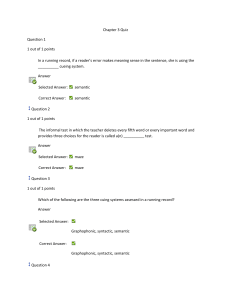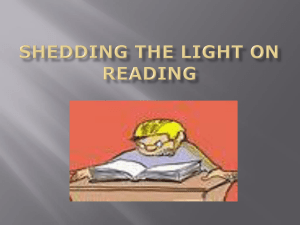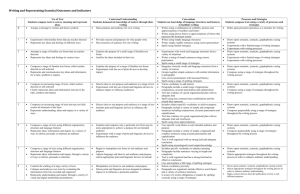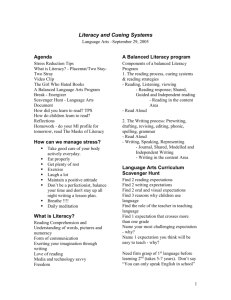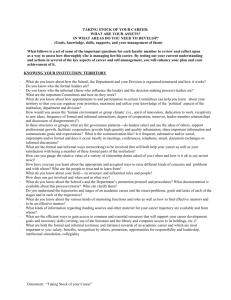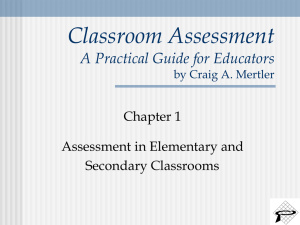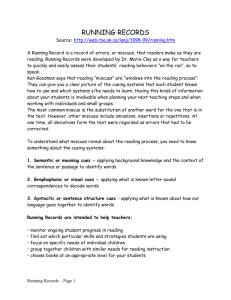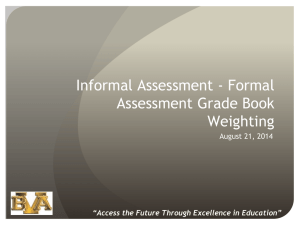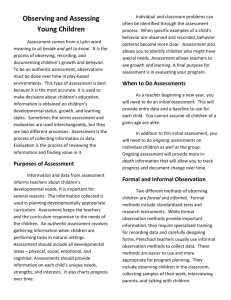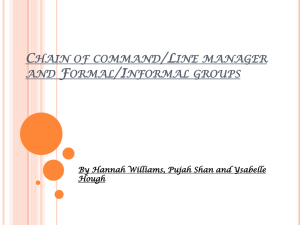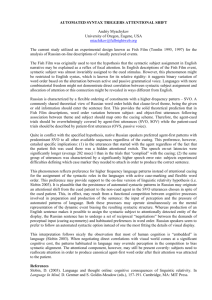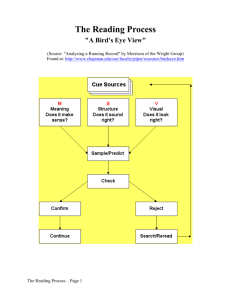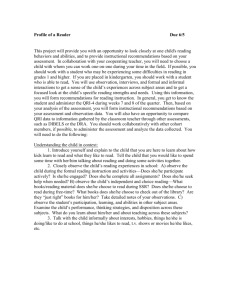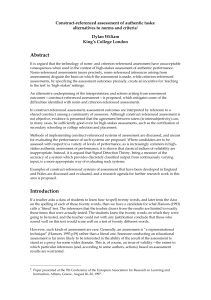Chapter 3 Quiz
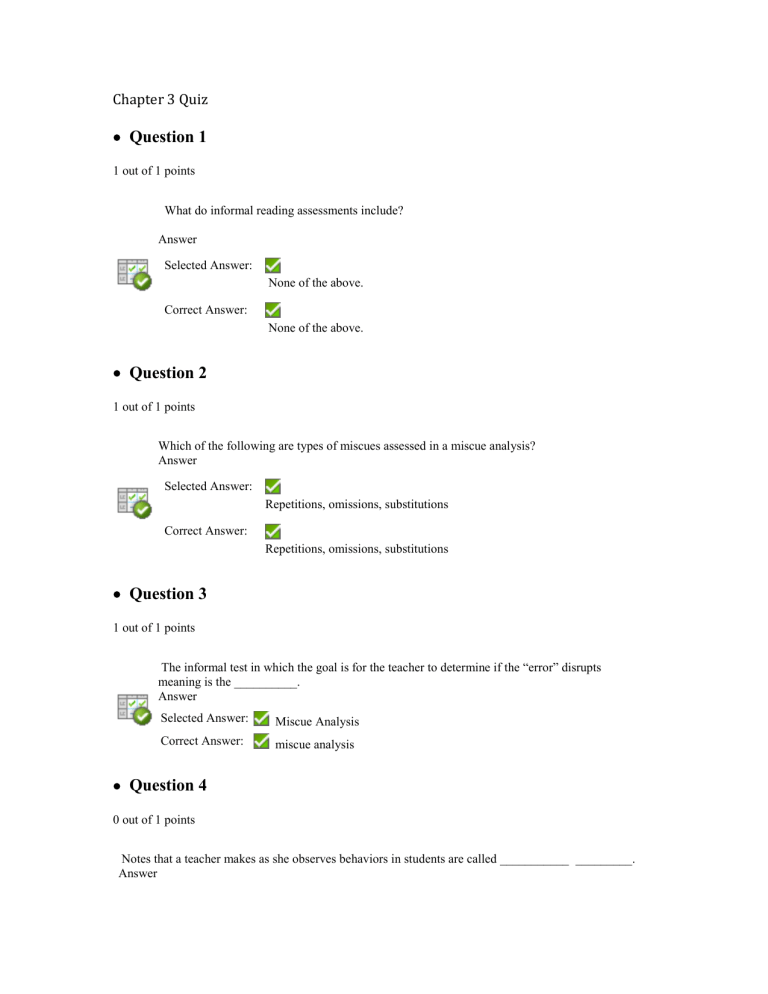
Chapter 3 Quiz
Question 1
1 out of 1 points
What do informal reading assessments include?
Answer
Selected Answer:
None of the above.
Correct Answer:
None of the above.
Question 2
1 out of 1 points
Which of the following are types of miscues assessed in a miscue analysis?
Answer
Selected Answer:
Repetitions, omissions, substitutions
Correct Answer:
Repetitions, omissions, substitutions
Question 3
1 out of 1 points
The informal test in which the goal is for the teacher to determine if the “error” disrupts meaning is the __________.
Answer
Selected Answer:
Correct Answer:
Miscue Analysis
miscue analysis
Question 4
0 out of 1 points
Notes that a teacher makes as she observes behaviors in students are called ___________ _________.
Answer
Correct Answer: anecdotal notes
Question 5
1 out of 1 points
Formal tests that assess the point at which the student has achieved mastery of a predetermined goal, but do not compare students, are called __________ tests.
Answer
Selected Answer:
Criterion-referenced
Correct Answer:
criterion-referenced
Question 6
1 out of 1 points
Which of the following is one of the standards for assessment as written by the National
Council of Teachers of English and the International Reading Association?
Answer
Selected Answer:
Assessments must be fair.
Correct Answer:
Assessments must be fair.
Question 7
1 out of 1 points
In a running record, if a reader’s error makes meaning sense in the sentence, she is using the
__________ cueing system.
Answer
Selected Answer:
Semantic
Correct Answer:
semantic
Question 8
1 out of 1 points
Which of the following are the three cuing systems assessed in a running record?
Answer
Selected Answer:
Graphophonic, syntactic, semantic
Correct Answer:
Graphophonic, syntactic, semantic
Question 9
1 out of 1 points
In a running record, if the word a student reads in error resembles the word in the text, he is using the __________ cueing system.
Answer
Correct Answer: graphophonic
Question 10
1 out of 1 points
Formal tests—developed by publishers who have administered them to large populations of students from all different geographic locations and socioeconomic backgrounds in order to develop a “measuring stick”—are called __________.
Answer
Selected Answer:
Norm-referenced
Correct Answer:
norm-referenced
Question 11
0 out of 1 points
A(n) __________ lists competencies that students are expected to have mastered and are used as scoring guides for particular assignments or for particular checkpoints within the school year.
Answer
Correct Answer: rubric
Question 12
1 out of 1 points
All of the following are traits of an emergent reader EXCEPT
Answer
Selected Answer:
Pointing to words when reading
Correct Answer:
Pointing to words when reading
Question 13
1 out of 1 points
Formal reading tests that indicate readers’ strengths and weaknesses are called __________.
Answer
Correct Answer: diagnostic test
Question 14
0 out of 1 points
The informal test in which the teacher deletes every fifth word or every important word and provides three choices for the reader is called a(n) __________ test.
Answer
Correct Answer: maze
Question 15
1 out of 1 points
Teachers can administer a __________ to help them find reading materials that are based on the student’s interests.
Answer
Correct Answer: personal interest inventory
Question 16
1 out of 1 points
The informal test in which the teacher deletes every fifth word or every important word and puts a blank in the place of that deleted word is called a(n) __________ test.
Answer
Correct Answer: cloze
Question 17
0 out of 1 points
The informal test in which a teacher analyzes the language system that a student uses when making an error or self-correction is the __________
Answer
Correct Answer: running record
Question 18
1 out of 1 points
All of the following are individual intelligence tests EXCEPT
Answer
Selected Answer:
Woodcock Johnson
Correct Answer:
Woodcock Johnson
Question 19
1 out of 1 points
Which of the following is the U.S. Supreme Court case that ruled that students who were not native English speakers had to receive instruction that they could understand?
Answer
Selected Answer:
Lau v. Nichols
Correct Answer:
Lau v. Nichols
Question 20
1 out of 1 points
All of the following are main goals of informal reading assessment instruments EXCEPT
Answer
Selected Answer:
Comparing one student to another
Correct Answer:
Comparing one student to another
Question 21
1 out of 1 points
In a running record, if a student’s reading error sounds right in the sentence, he is using the
__________ cueing system.
Answer
Selected Answer:
Syntactic
Correct Answer:
syntactic
Question 22
1 out of 1 points
What do formal reading assessments include?
Answer
Selected Answer:
None of the above.
Correct Answer:
None of the above.
